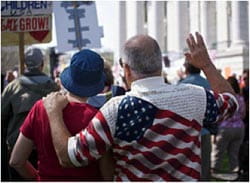 The Tea Party is a political movement that embraces populist, conservative, and libertarian values. Its name evokes the colonists' 1773 Boston Tea Party protest against British tax policies. It is not a political party, and its members include Republicans, Democrats, and Libertarians. Nonetheless, the majority of Tea Party members vote Republican, and recommend Republican candidates.
The Tea Party is a political movement that embraces populist, conservative, and libertarian values. Its name evokes the colonists' 1773 Boston Tea Party protest against British tax policies. It is not a political party, and its members include Republicans, Democrats, and Libertarians. Nonetheless, the majority of Tea Party members vote Republican, and recommend Republican candidates.
The Tea Party's agenda includes cutting the size of the federal government, individual freedoms, reduced taxation, states' rights, and individual responsibility. It has no religious agenda, nor does it advocate any religious position. In this sense, the Tea Party cannot be called a religious movement.
The fact that the political values and aims of many conservative Christians overlap those of the Tea Party has created the appearance of a religious quality to the movement. Pew Research reports show that many who identify with the "religious right" also support the Tea Party. Yet more than half of the Tea Party's members do not support, or are unaware of, the far right Christian positions. That is, the Tea Party's agenda is not derived from, nor does it advocate, the positions of ultra-conservative Christian groups. These groups, however, find the Tea Party's platform more compatible with their own interests.
Tea Party members are overwhelming conservative both on economic and national fiscal policies as well as on social issues; they are generally pro-life and they oppose same-sex marriage. A large proportion of its membership is white and evangelical. Nevertheless, other Christian positions find it less compelling in light of their political priorities.
For example, Progressive and liberal Christian voices have challenged the religious character of the Tea Party and have accused it of being in conflict with Christian values. Their political priorities draw on other religious perspectives and they believe the Tea Party's focus on individual responsibility and smaller government neglects the larger Christian values of social justice and compassion for the poor. Jim Wallis of Sojourners has pointedly criticized the idea that libertarian and Christian values are compatible.
Roman Catholic attitudes toward the Tea Party's goals and methods are diverse. While many of their social values align with Tea Party positions, particularly on abortion and marriage, their beliefs about the proper role of the government in health care, immigration, and employment, among other issues, reflect less libertarian positions. Some recent studies show that approximately half of Roman Catholics sympathize with Tea Party frustrations, though far fewer would support a Tea Party candidate.
Since President Obama's election in 2008, the Tea Party has increased its numbers and its presence in American politics. Several prominent voices in the 2012 campaign are affiliated with the Tea Party, including Ron Paul, Michele Bachmann, and Rick Perry.
Related Reading
"Is the Tea Party a Christian Movement?" (Timothy Dalrymple, Patheos.com)
"How Christian Is Tea Party Libertarianism?" (Jim Wallis, Sojourners)
"Tea Party Closely Linked to Religious Right, Poll Finds" (ABC News)
"Is the Religious Right Taking Over the Tea Party?" (Tim Koelkebeck, Huffington Post)
"The Tea Party Religion" (Sarah Posner, Religion Dispatches)
"The Intersection of Tea Party and Religion" (Jamshid Ghazi Askar, Deseret News)
"Does the Tea Party Have a Religion Problem?" (R.R. Reno, First Things)
"Tea Party Politics and Christianity: Strange Bedfellows?" (ReligionLink.com)




